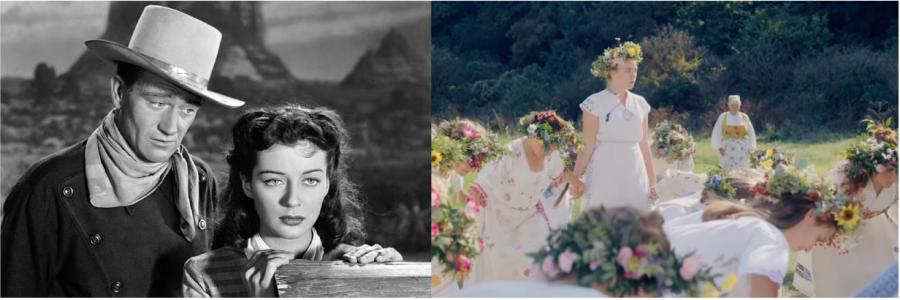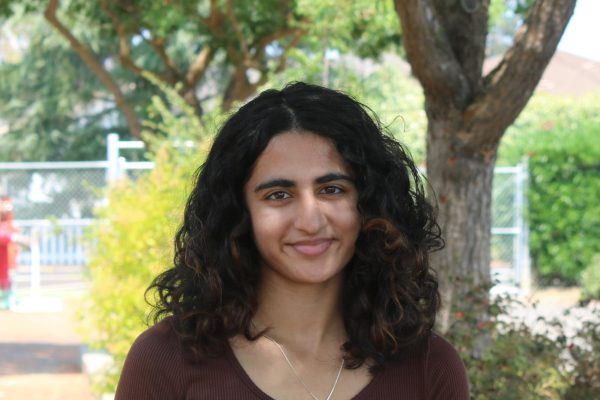How A24 is changing the film industry
The 1947 Western film “Angel and the Badman” is pictured next to A24’s 2019 “Midsommar.” Both films are symbolic of the genres the film industry leaned toward at the time.
The life cycle of a film in the 20th century was predictable and routine. In the 1920s through 1950s, major studios like MGM, Paramount Pictures and Warner Bros. dominated every aspect of the film industry. Their vertical integration encapsulated film production, distribution and exhibition, as well as any step in between. Filmmaking was organized and recycled, while still begetting results that the public adored.
Musicals and screwball comedies lit up screens during the ’40s. Westerns, of the spaghetti and Clint Eastwood variety, permeated the ’50s. By the time the ’90s and 2000s rolled around, female-driven comedies and contemporary retellings of classic novels were in vogue.
With the short attention span of American audiences and production studios’ monopoly over the industry, it’s clear that not only is Hollywood fickle, but it’s also historically been dominated by the same few titans.
One could say that these companies’ modern-day rival is Disney, a corporation that owns everything from Pixar to Marvel.
But gaining notoriety amongst young audiences is A24, an independent production company known for its horror-leaning films and eccentric plotlines.
A24 is not your typical production company.
True to its independent nature, A24 tells strange stories, ranging from supernatural and mythical to contemporary and chick-flick-esque.
Their most popular works, like the hit HBO show “Euphoria” or films like “Hereditary” and “Bodies Bodies Bodies,” are just the tip of the iceberg. Since their genesis, they have been unafraid to delve into the unconventional, not limited by stereotypes or trends of our time.
In many ways, A24 dictates its own trends, such as its lean towards the horror genre.
Just as movie musicals were the fashion of the ’40s, weird and wacky horror is running the show with the help of A24.
While slasher films like “Scream” and “Scary Movie” might come to mind when one thinks of horror, A24 has a slightly different definition. Using horror as a vehicle to explore grief and family turmoil, the genre is used to elevate films to new heights of emotional depth, not just provide a couple well-paced screams.
The company often draws from themes of occult and the paranormal, which is relatively unmarked territory for big, successful production companies. They tend to veer away from horror because it doesn’t do as well at the award shows, nor does it mesh as well with audiences. But at A24, horror is not only celebrated, it’s done to the extreme.
Picture the scariest movie you’ve ever seen. Add a floating head, generational curse or a stare to rival Kubrick’s, and that’s an A24 movie.
A24 has always provided audiences with a sense of freedom by exploring diverse themes. Their unique, and sometimes weird, filmography shows that the company isn’t afraid to disturb, disgust, or delight audiences.
The studio has also hit home runs with a recent string of successful comedy dramas. Their most recent hit was “Everything Everywhere All At Once,” which nabbed Best Picture at the 95th Academy Awards and took home six other wins as well. Back in 2016, “Moonlight,” a coming-of-age drama, won Best Picture too. Both films feature casts of primarily people of color and tell stories that often don’t make it to the big screens, much less win big at the Oscars.
The types of movies that A24 produces are something of a rarity; people of color take up just under 39% of leading roles in Hollywood. But A24’s representation could be marking a change in direction, a sort of new dawn for the film industry.
The stories they tell, narrated and brought to life by people of color, broaden the definition of representation. People of color sharing their stories gives them the power to share their perspectives with mass audiences. “Everything Everywhere All At Once” is the perfect example, since it draws from Eastern storytelling methods and showcases Chinese culture in authentic ways.
By telling the stories of more people of color, normalizing minorities on screen, and genre-bending to the extreme, A24 is single-handedly rewriting what it means to be a blockbuster film.
Female-driven films also have a permanent home at A24, with past successes such as “Midsommar” and “Lady Bird.”
“Midsommar” is an eerie psychological horror film that tells the story of American tourists who find themselves in the middle of a sinister Scandinavian cult. The film works as an allegory for grief, but leaves viewers both confused and amazed in the most uncomfortable way possible.
While being an exploration of cinematography and celebration of the horror genre, “Midsommar” also portrays a female lead in all her glory: main character Dani (Florence Pugh) is mourning, terrified, disturbed then empowered as the film progresses.
Seeing women in roles that defy norms is important not only so that more women are on the silver screen (just 30% of films in 2021 featured female protagonists), but so that the formerly one-dimensional portrayal of women in film can be rectified.
You’ve heard of “female rage,” clips of which have overtaken TikTok and the like. Audiences need to see female-driven stories written by women where they are fearlessly emotional, taking up space in previously unseen ways.
Greta Gerwig’s “Lady Bird” is another tale of woe and madness, but this time, it’s viewed through the lens of a high school girl. Just as scary, but slightly more endearing. It’s a coming-of-age story, but reworked so that it highlights all the facets of the modern-day woman.
A24 is not the only studio telling the stories of previously silenced demographics through film, but could very well be the most successful at it. By being a box office powerhouse while defying terms previously written in history, A24 is doing the impossible.
Oftentimes in the film industry, the stories of the underrepresented go, well, unrepresented. These stories remain unspoken, floating in the abyss without an audience to reach.
But they are worthwhile, important stories nevertheless. And it seems that now, through A24, they now have a home on screens everywhere. Whether it is a mind-bending piece of horror or a wholesome romantic comedy, films of all calibers, genres and for all types of audiences are made through A24.
Fearlessly showcasing queer actors and actors of color is a big leap from films of the past. 70 years ago, unless you were a cowboy, it was hard to make it in the film industry.
Now, there’s a new cowboy in town, who goes by the name of A24.




